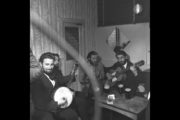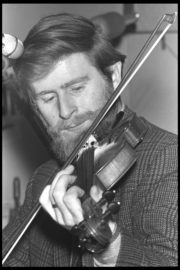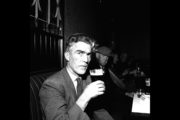“In 1967 Ireland or parts of it were living in the 30’s when you couldn’t mention such things as S.E.X…..you could spell it but you certainly couldn’t say it.” – Ronnie Drew
1967 is known as the summer of love. Hippies in San Francisco were in full flight, Elvis married Priscilla, London was swinging and the Beatles released Sgt Peppers. But a wee ditty from an Irish ballad group that told of a wife’s affair under the nose of her drunken husband was to prove a little too much for our national airwaves. This is the story of the banning of Seven Drunken Nights.
“I’m sure whoever was responsible in Radio Éireann would say now weren’t we terrible gobshites.” – Ronnie Drew
The sixties may have been swinging from London to San Francisco but Ireland was still under the thumb of nanny church and state. By 1965 The Dubliners had become one of Irelands leading folk bands. They broke the mould in Ireland….long haired bearded youths playing folk music were not the norm at the time. The Dubliners were on no great quest for respectability, and were known to take a drink….so it made sense that they should stumble across Seven Drunken Nights and end up recording it without giving its storyline a second thought.
In 1967 The Dubliners had decided, on advice from Dominic Behan, that they would sign to Major Minor to see about taking their band to the next level. Major Minor was run by Phil Solomon co-director of Radio Caroline – other notable Irish releases from Major Minor that year included Gloria by a a young Belfast band called THEM. When the Dubliners recorded their album for the label it was Phil who decided that this wee ditty called Seven Drunken Nights should be the single. Seosamh Ó hÉanaigh, the Connamara sean nós singer had already sung the song at Newport Folk festival with Liam Clancy when he passed it on to Ronnie Drew in O’Donoghues one night. The Dubliners had never thought of it as a great song – “He perked up when he heard Seven Drunken Nights. He said that’s going to be your single…Our single? Are ye joking?” recalls John Sheahan. Solomon had recently become co-director of Radio Caroline and many Major Minor records were played off the air, including Seven Drunken Nights. The National broadcaster in Ireland was not quite so forthcoming.
Slowly the song started creeping up the English charts surrounded by the big chart acts of the day, The Beatles, The Rolling stone, The Kinks…….but RTÉ decided its subject matter was not acceptable. The band and Solomon were delighted with the publicity. The band even sent a letter to the Taoiseach asking for him to intervene, as their success was now bringing them to venues like the Royal Albert Hall.
Even Seosamh Ó hÉanaigh was contacted for comment, something which his nephew, broadcaster Seán Ó hÉanaigh recalls for us, outlining in one interview that he had recorded the song in English decades earlier and that the version in Irish, Peigín is Peadar was regularly played on RTÉ without any issue. Quite often songs sung in Irish not only bypass the censor but will often be a staple diet taught to our children in school!
When asked what he remembers about appearing on Top of the Pops, John Sheahan says he remembers he had another gig the next day – his wedding!! Another wonderful story after that appearance involves avant garde British director Peter Whitehead who went from working with The Rolling Stones to being sent to Ireland by the BBC to film a video for Seven Drunken Nights with the Dubliners after the response to their appearance on Top of the Pops. When he woke up the next morning in Dublin in bed with a young red head with no sign of his wallet or the footage he wondered if the old adage of life imitating art had been taken a bit too far! When he salvaged 3 minutes of the footage for the BBC, that video played 3 weeks in a row on Top of the Pops and saw the song climb to number 7 in the UK charts bypassing a young fella called Jimi Hendrix who was at number 8!
Throughout this great success the ban on RTÉ’s airwaves continued. Headlines in newspapers and the letters pages were filled with reaction to the story. “If it is good enough to get into the English charts, surely its good enough to be played on RTÉ!” – signed broadminded girls from Balbriggan. A silent protest to the nanny state gave the best response to the ban from the public. Seven Drunken Nights went straight to Number One in Ireland.
Seven Drunken Nights is that most wonderful of Irish stories with more twists than a curly wurly!
Producer/Director – Michael McCormack
Presenter/Reporter – Garry Mac Donncha



